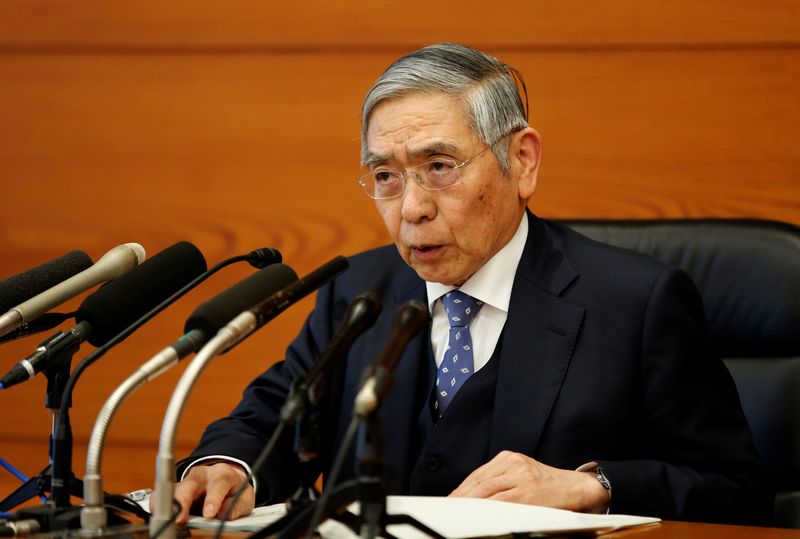 © Reuters. FILE PHOTO: Bank of Japan Governor Haruhiko Kuroda speaks at a news conference in Tokyo, Japan, January 21, 2020. REUTERS/Kim Kyung-Hoon
2/2
© Reuters. FILE PHOTO: Bank of Japan Governor Haruhiko Kuroda speaks at a news conference in Tokyo, Japan, January 21, 2020. REUTERS/Kim Kyung-Hoon
2/2
By Tetsushi Kajimoto and Daniel Leussink
TOKYO (Reuters) -Japanese policymakers held fast to their usual line on yen weakness on Wednesday, stating that rapid moves were undesirable, but confounded expectations they may escalate warnings about the sliding currency as it fell to fresh 20-year lows.
"Various macro models suggest (the weak yen) is a plus to the economy," as long as its moves are stable, Bank of Japan Governor Haruhiko Kuroda told parliament on Wednesday, reiterating his stance.
Finance Minister Shunichi Suzuki said in parliament that the weak yen has both positives and negatives for the economy, although it could be negative if wages remain stagnant, which would mean potential harm to households because of higher costs of living.
The yen weakened beyond 133 to the dollar
Speculation in financial markets has lingered that Japan may somehow intervene to arrest the yen weakness, which is pushing up import prices and households' cost of living, by intervening to sell dollars - a switch from its traditional stance of trying to weaken the yen.
Japan has not intervened in the currency markets since it sought to tame a surge in the yen after a devasting earthquake and tsunami in March 2011.
In the past, policymakers have preceded any action in currencies by escalating their verbal warnings, which have drawn close attention from the markets.
"There's no clear threshold as to when policymakers may escalate warning against weak yen. They may wait until it tops 140 yen," said Daisuke Karakama, chief market economist at Mizuho Bank.
"With voters' support staying high, policymakers appear complacent. Therefore they did not want Kuroda to say something unnecessary to rock the boat."
Kuroda was on the defensive on Wednesday over a remark he made earlier this week that Japanese households were becoming more accepting of higher prices.
He retracted the comment in his appearance before parliament, after drawing criticism for apparent insensitivity to the impact of higher living costs for consumers.
"My expression that households are becoming more accepting of price hikes was not appropriate at all, so I withdraw it," he said.
"What's most important is for firms with better profits from the weak yen to boost capital expenditures and raise wages, to drive a positive cycle of greater incomes leading to more spending."
Kuroda said moves in the dollar may not be affected much by U.S. rate hikes unless they are stronger than expected, according to a recording of an online interview by the Financial Times.

